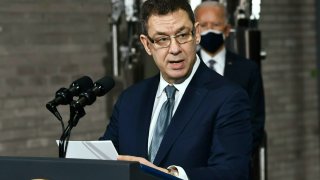
- Pfizer CEO Albert Bourla said people will "likely" need a third dose of a COVID-19 vaccine within 12 months of getting fully vaccinated.
- He also said it's possible people will need to get vaccinated against the coronavirus annually.
Pfizer CEO Albert Bourla said people will "likely" need a booster dose of a COVID-19 vaccine within 12 months of getting fully vaccinated. His comments were made public Thursday but were taped April 1.
Bourla said it's possible people will need to get vaccinated against the coronavirus annually.
"A likely scenario is that there will be likely a need for a third dose, somewhere between six and 12 months and then from there, there will be an annual revaccination, but all of that needs to be confirmed. And again, the variants will play a key role," he told CNBC's Bertha Coombs during an event with CVS Health.
"It is extremely important to suppress the pool of people that can be susceptible to the virus," Bourla said.
The comment comes after Johnson & Johnson CEO Alex Gorsky told CNBC in February that people may need to get vaccinated against COVID-19 annually, just like seasonal flu shots.
Get Tri-state area news delivered to your inbox.> Sign up for NBC New York's News Headlines newsletter.
Researchers still don't know how long protection against the virus lasts once someone has been fully vaccinated.
Money Report
Pfizer said earlier this month that its COVID-19 vaccine was more than 91% effective at protecting against the coronavirus and more than 95% effective against severe disease up to six months after the second dose. Moderna's vaccine, which uses technology similar to Pfizer's, was also shown to be highly effective at six months.
Pfizer's data was based on more than 12,000 vaccinated participants. However, researchers say more data is still needed to determine whether protection lasts after six months.
Earlier Thursday, the Biden administration's COVID response chief science officer, David Kessler, said Americans should expect to receive booster shots to protect against coronavirus variants.
Kessler told U.S. lawmakers that currently authorized vaccines are highly protective but noted new variants could "challenge" the effectiveness of the shots.
"We don't know everything at this moment," he told the House Select Subcommittee on the Coronavirus Crisis.
"We are studying the durability of the antibody response," he said. "It seems strong but there is some waning of that and no doubt the variants challenge ... they make these vaccines work harder. So I think for planning purposes, planning purposes only, I think we should expect that we may have to boost."
In February, Pfizer and BioNTech said they were testing a third dose of their COVID-19 vaccine to better understand the immune response against new variants of the virus.
Late last month, the National Institutes of Health started testing a new COVID vaccine from Moderna in addition to the one it already has, designed to protect against a problematic variant first found in South Africa.
Moderna CEO Stephane Bancel told CNBC on Wednesday that the company hopes to have a booster shot for its two-dose vaccine available in the fall.






